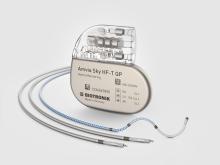Diagnosing AF How BIOMONITOR IV with SmartECG Enhances Detection and Saves Time
Diagnosing atrial fibrillation (AF) can be particularly challenging, especially when episodes are infrequent or asymptomatic. Implantable cardiac monitors (ICMs) offer continuous long-term monitoring of arrhythmias; however, doctors can spend valuable time and resources analyzing false-positive AF episodes, leaving patients waiting for accurate answers. BIOTRONIK’s BIOMONITOR IV with SmartECG Technology changes this. As a powerful combination of advanced sensing technology and intelligent algorithms, it delivers precise, clinically meaningful data to help doctors diagnose AF.
Below, we’ll explain how BIOMONITOR IV with SmartECG enables accurate and continuous rhythm monitoring, review the clinical data supporting it, and demonstrate how it lightens physicians’ workloads by significantly reducing false arrhythmia detections and minimizing time spent on episode reviews.

How BIOMONITOR IV Enables Accurate AF Diagnosis
Diagnosing atrial fibrillation, especially when episodes are sporadic or asymptomatic, requires continuous, long-term, and reliable rhythm monitoring. BIOMONITOR IV is a miniaturized insertable cardiac monitor (ICM) designed to meet this need. Once inserted, it captures high-quality ECGs with industry-leading signal quality, around the clock – powered by a superior sensing vector and extended device longevity of up to 5 years. Simultaneously, SmartECG leverages artificial intelligence (AI) and advanced algorithms to analyze these signals and detect atrial fibrillation and other arrhythmias with high accuracy. The system ensures daily connectivity via our Home Monitoring platform, giving physicians timely and reliable access to actionable data, without requiring patient interaction or in-person visits.
Unlike traditional ICMs that may flag non-actionable episodes, SmartECG Technology uses advanced classification logic to automatically distinguish between relevant and irrelevant rhythm events, reducing false positives and highlighting clinically relevant events. The result is a clearer picture of a patient’s arrhythmic burden, which has proven to be especially valuable in cases of cryptogenic stroke, syncope, or unexplained palpitations. By combining continuous monitoring with smart, accurate interpretation, BIOMONITOR IV helps physicians diagnose AF with greater confidence and clarity.
Clinically Proven: Smarter Technology with Improved Accuracy
Clinical data confirms that BIOMONITOR IV with SmartECG technology significantly improves diagnostic accuracy while reducing unnecessary workload. In a study presented by Kapur et al. at APHRS 2023, researchers found that the AI- and machine learning-based algorithm used in BIOMONITOR IV reduced false positives by 86% across all major arrhythmias while keeping 98% of the clinically relevant episodes.[i] This reduction means fewer irrelevant alerts and more clinically meaningful data, allowing physicians to spend fewer hours per week reviewing non-actionable data and instead focus their attention on cases that truly require intervention.
Reducing false positives isn’t just a technical improvement—it has a direct impact on physician workload. As shown in a 2024 study by Bisignani et al. published in Frontiers in Cardiovascular Medicine, the use of AI and advanced signal processing in ICMs, such as BIOMONITOR IV, effectively reduces the volume of remote ECG data that physicians need to assess, thereby reducing the time spent on episode reviews by 42%, without compromising arrhythmia detection sensitivity.[ii] By automatically analyzing hundreds of data points per ECG, SmartECG streamlines data evaluation and helps physicians and healthcare teams focus on meaningful clinical decisions rather than administrative burden.
Beyond detecting atrial fibrillation, BIOMONITOR IV is the first device capable of distinguishing between premature ventricular and atrial contractions (PVCs and PACs) and tracking their burden over time. Since high PVC and PAC burdens are linked to increased risks of AF development, stroke, heart failure, and mortality, this capability provides physicians with critical insights for more accurate risk assessment and personalized treatment planning.[iii] [iv] [v]
With automatic daily transmissions via BIOTRONIK Home Monitoring, physicians receive timely, accurate updates without relying on patient-initiated data uploads or in-person visits. This continuous, hands-off data flow has a reliable industry-leading 98% daily transmission rate[vi], which means fewer missed episodes. By streamlining data review, BIOMONITOR IV enables doctors to focus their time where it matters most: patient care.
We take Atrial Fibrillation seriously. Read more about BIOTRONIK’s forward-thinking solutions for AF management in our other blog posts for AF Awareness Month. To learn more about how BIOMONITOR IV with SmartECG can transform your AF diagnosis workflow, visit our website or contact your BIOTRONIK representative today.
[i] Kapur et al., AI/machine learning AF algorithm improves clinical workflow in ICM. Presented at 16th Asia Pacific Heart Rhythm Society Scientific Session in Conjunction with CardioRhythm (APHRS 2023), 31 August - 3 September, Hong Kong.
[ii] Bisignani G, Cheung JW, Rordorf R, Kutyifa V, Hofer D, Berti D, Di Biase L, Martens E, Russo V, Vitillo P, Zoutendijk M, Deneke T, Köhler I, Schrader J and Upadhyay G (2024) Implantable cardiac monitors: artificial intelligence and signal processing reduce remote ECG review workload and preserve arrhythmia detection sensitivity. Front. Cardiovasc. Med. 11:1343424.
[iii] Binici Z, Intzilakis T, Nielsen OW, Køber L, Sajadieh A. Excessive supraventricular ectopic activity and increased risk of atrial fibrillation and stroke. Circulation. 2010;121(17):1904–11. doi: 10.1161/CIRCULATIONAHA.109.874982
[iv] Larsen BS, Kumarathurai P, Falkenberg J, Nielsen OW, Sajadieh A. Excessive Atrial Ectopy and Short Atrial Runs Increase the Risk of Stroke Beyond Incident Atrial Fibrillation. J Am Coll Cardiol. 2015;66(3):232–41. doi: 10.1016/j.jacc.2015.05.018
[v] Todo K, Iwata T, Doijiri R, Yamagami H, Morimoto M, Hashimoto T, et al. Frequent Premature Atrial Contractions in Cryptogenic Stroke Predict Atrial Fibrillation Detection with Insertable Cardiac Monitoring. Cerebrovasc Dis. 2020:1–7. doi: 10.1159/000505958. PubMed PMID: 32023609
[vi] Mariani JA, Weerasooriya R, van den Brink O, Mohamed U, Gould PA, Pathak RK, et al. Miniaturized implantable cardiac monitor with a long sensing vector (BIOMONITOR III): Insertion procedure assessment, sensing performance, and home monitoring transmission success. J Electrocardiol. 2020;60:118–25. doi: 10.1016/j.jelectrocard.2020.04.004




